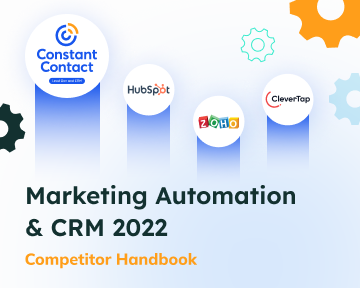Nowadays it is essential to have the right tools to streamline marketing efforts. While Marketing Automation and CRM vs. email marketing software may sometimes be hard to distinguish from each other, it’s important to note that each of them serve a distinct purpose in the realm of marketing strategy. Let’s dive into the nuances of each to better understand their roles and functionalities.
1. Marketing Automation and CRM
Marketing Automation and CRM platforms are comprehensive systems designed to automate marketing processes across multiple channels: from email and social media to website actions and more. These platforms allow marketers to create workflows that trigger specific actions based on customer behaviour, demographics, and other predefined criteria. In this article we united Marketing Automation and CRM (Customer Relationships Management) as they often function hand in hand. However, CRM platforms also may also exist independently.
It allows businesses to store and organise customer data, track interactions, and manage sales pipelines effectively. While CRM systems often include some marketing functionalities, their main objective is to centralise customer information and facilitate communication between sales teams and clients.
Key Features of combined Marketing Automation and CRM solutions
- Contact management: stores and organises customer information, including contact details, interactions, and purchase history.
- Sales pipeline management: tracks leads and opportunities through the sales process, from initial contact to conversion.
- Automated campaigns: let you schedule and deploy targeted marketing campaigns across various channels.
- Lead nurturing: guides leads through the sales funnel with personalised content and interactions.
- Behavioural tracking: monitors and analyses customer behaviour to tailor marketing efforts accordingly.
- Integration capabilities: seamlessly integrates with other tools such as CRM systems and analytics platforms.
- Task automation: automates repetitive tasks such as follow-up emails and appointment scheduling to streamline workflows.
- Personalisation of interactions: delivering relevant content based on customer data.
- Reporting and analytics: generates reports on sales performance, customer acquisition, and retention metrics.
Examples of combined Marketing Automation and CRM solutions:
“Lead Gen and CRM” by Constant Contact, Hubspot, CleverTap, ZOHO.
Read more about these Marketing Automation and CRM platforms in our handbook.
2. Email Marketing Softwares
Email marketing softwares are specialised softwares designed specifically for creating, sending, and tracking email campaigns. These platforms offer features such as customisable templates, list segmentation, and analytics to help marketers engage subscribers and drive conversions through email.
Key Features of email marketing software:
- Email template library: you can choose from a variety of professionally designed templates or create custom designs to suit your brand.
- List management: lets you segment email lists based on demographics, behaviour, and other criteria to send targeted campaigns.
- Automated workflows: enable you to set up automated email sequences triggered by specific actions or events, such as welcome emails or abandoned cart reminders.
- Analytics and reporting: tracks open rates, click-through rates, and other metrics to measure the effectiveness of email campaigns.
Examples of email marketing solutions:
Mailchimp, Klenty, Mad Mimi, GetResponse.
Conclusion
Marketing Automation and CRM may overlap with email marketing software in some functionalities. Marketing Automation and CRM solutions are focused on centralising customer data and via that enables marketing and sales processes. In this complex solution email marketing will be here as one of the core functions, largely enabled by the accumulated data. Email marketing softwares has its limited opportunities when it comes to tracking data, however its focus will be on creating powerful targeted emails and email automations that engage subscribers and drive conversions.
Some companies may choose to use both the systems simultaneously, especially if they have to conduct both B2B and B2C marketing. However, the perfect solution will ultimately still depend on the specific nature of your business.
What's next for you?
In the day to day of the “Lead Gen and CRM” team, we observed that small businesses and startups especially usually require one complete solution that is easily managed by a compact team. Even if your amount of customers grows rapidly the solution should be able to accommodate scaling up. Reach out to us to find out whether email marketing or Marketing Automation & CRM will fit your business the best.





